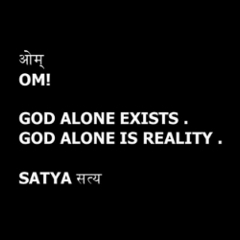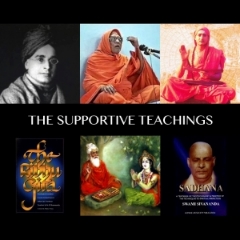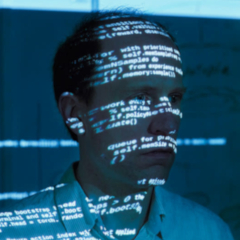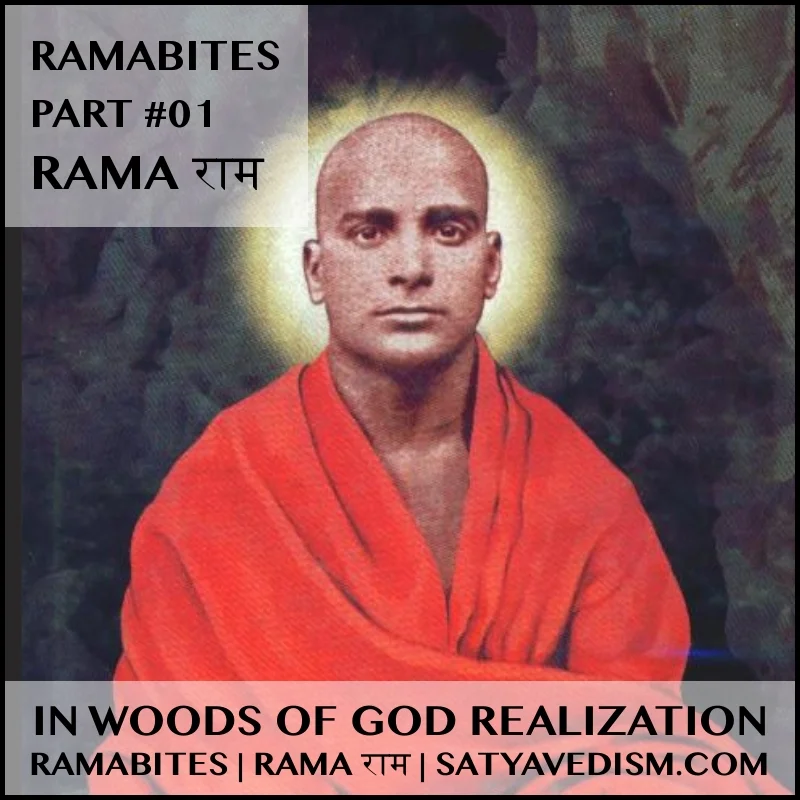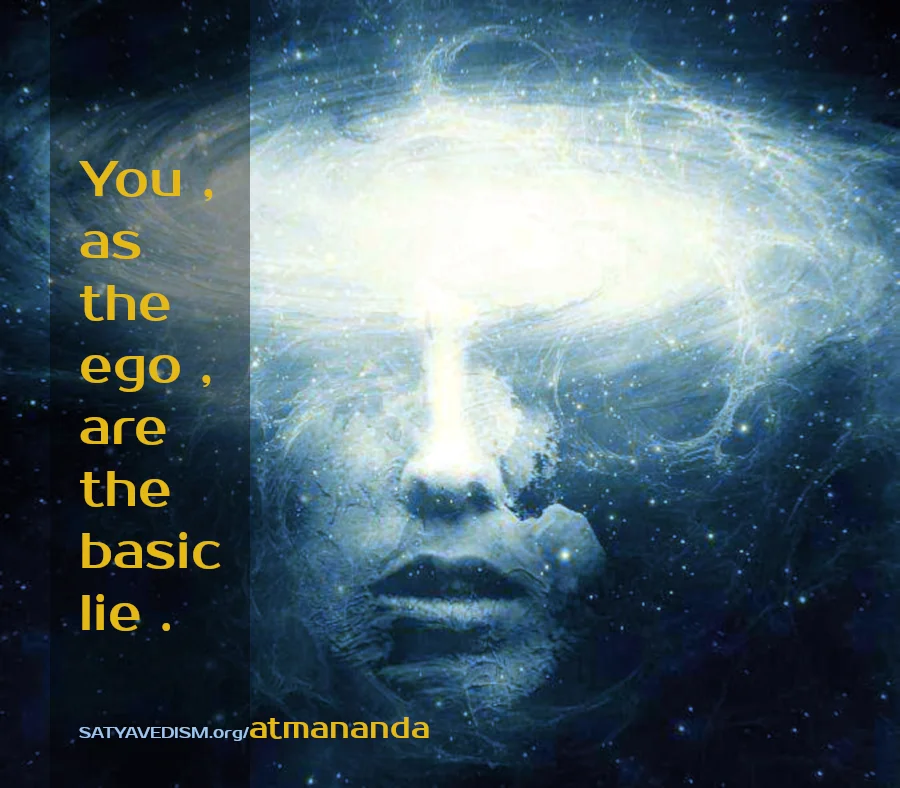TROTA | CHAPTER 4 | SEL0280 TO SEL0296
| | homeTROTA | CHAPTER 4 | SEL0280 | SWAMI KRISHNANANDA
|| 4.01 | BRAHMAN AS EXISTENCE OR BEING | CONT ||
We read of Sanatkumara leading the thought of Narada from inadequate conceptions of Truth to more adequate conceptions , until at last Narada asserts the supremacy of the Bhuma , the " absolutely great " , the " unlimited " , beyond which there is nothing , which comprehends all , fills all space , and is identical with the Self in us .
This Bhuma is the Essential Brahman where one sees nothing else , hears nothing else , understands nothing else .
It is Bliss and Immortality , the plenum of felicity .
This is the Complete Being .
TROTA | CHAPTER 4 | SEL0281 | SWAMI KRISHNANANDA
Now , the conception of Reality as constituting being gives rise simultaneously to the idea of non-being .
The Rigveda ( X . 129 . 1 ) says that in the beginning there was neither non-being nor being ( na asad asit , no sad asit ) .
Being was not , because there was no non-being .
Non-being was not , for there was no being .
TROTA | CHAPTER 4 | SEL0282 | SWAMI KRISHNANANDA
Truth is a super-intellectual transcendence of the ideas of being and non-being , of whatever is concerned with the temporal relations of thought , for in what is Real there is no psychosis of any kind .
According to the Rigveda , even " immortality and death are its shadows " .
Whatever truly exists is the Real .
TROTA | CHAPTER 4 | SEL0283 | SWAMI KRISHNANANDA
It is " the being and the beyond , the expressed and the unexpressed , the founded and the unfounded , consciousness and unconsciousness , reality and unreality , the real , and whatever that is " ( Taitt . Up , II . 6 ) .
The Brihadaranyaka Upanishad ( II . 3 . 1 ) says that Brahman has two forms , " the formed and the formless , the mortal and the immortal , the existent and the moving , the real and the beyond " .
TROTA | CHAPTER 4 | SEL0284 | SWAMI KRISHNANANDA
There is a contrast between Brahman and the name-and-form world , the former being the beyond , the inexpressible , the foundationless , the unconscious , the unreal in relation to the latter which is empirically experienced as the being , expressible , founded , conscious , real .
TROTA | CHAPTER 4 | SEL0285 | SWAMI KRISHNANANDA
Logically , attribute or quality itself becomes an unsound concept when it is extended to the Absolute .
A thing has an attribute only in relation to another thing .
There is no meaning in saying that a substance has an attribute when that substance alone is said to exist .
TROTA | CHAPTER 4 | SEL0286 | SWAMI KRISHNANANDA
The nature of a self-existent absolute principle is indeterminable .
Every attribute limits it and creates a difference in non-difference .
TROTA | CHAPTER 4 | SEL0287 | SWAMI KRISHNANANDA
Brahman cannot be said to have any intelligible attribute , for Brahman is the entire existence and has nothing second to relate itself to .
TROTA | CHAPTER 4 | SEL0288 | SWAMI KRISHNANANDA
Sat ( being ) is an idea in relation to asat ( non-being ) , chit ( consciousness ) in relation to jada ( inertness ) , ananda ( bliss ) in relation to duhkha ( pain ) , ananta ( infinitude ) in relation to alpa ( limitedness ) , prakasha ( light ) in relation to tamas ( darkness ) .
Every qualitative concept involves relations , and every thought creates a duality .
TROTA | CHAPTER 4 | SEL0289 | SWAMI KRISHNANANDA
To think Brahman is to reduce Brahman to the world of experience .
Thought is possible only in an individualised state , but Brahman is not an individual , and is unapproachable by an individual .
Brahman cannot even be conceived of as light , for it has nothing to shine upon .
Not even is it consciousness , for it is conscious of nothing .
Consciousness or light in the absolute condition cannot be called as consciousness or light , for such conceptions are dualistic categories .
Being as it is in itself is nothing to the individual .
TROTA | CHAPTER 4 | SEL0290 | SWAMI KRISHNANANDA
It is not an object of knowledge .
Truth is independent , unrelated , self-existent ; but there is no such thing as an independent , unrelated , self-existent quality .
The only recourse to be taken is to admit the failure of the intellect in determining the nature of Reality and resort to negative propositions .
TROTA | CHAPTER 4 | SEL0291 | SWAMI KRISHNANANDA
" The Atman is not this , not this . " ( Brih Up , IV . 5 . 15 )
" The Atman is not that which is inwardly conscious , not outwardly conscious , not bothwise conscious , not a consciousness-mass , not conscious , not unconscious ; it is unseen , unrelated , ungraspable , indefinable , unthinkable , indeterminable , the essence of the consciousness of the One Self , the negation of the universe , peaceful , blissful , non-dual . " ( Mand . Up , 7 )
" It is unknown to those who know it . It is known to those who do not know it . " ( Kena Up , II . 3 )
These references depict the absolutely transcendent nature of Reality .
TROTA | CHAPTER 4 | SEL0292 | SWAMI KRISHNANANDA
" It is not obtainable by many even to hear of , and even when heard of , It remains unknown to many .
Wonderful is the declarer of It !
Blessed is the obtainer of It ! "
TROTA | CHAPTER 4 | SEL0293 | SWAMI KRISHNANANDA
The awe-inspiring Absolute is described as
" soundless , touchless , formless , imperishable , tasteless , constant , odourless , beginningless , endless , higher than the high , eternal , by knowing which one is liberated from the mouth of death " .
It exists in such a homogeneous and differenceless condition that
" whatever is here , is there also ; whatever is there , is here , "
and hence the spatial nature of existence with its concomitant differentiations of time and individuality is overcome in the indivisible constitutive essence of Brahman .
It , therefore , is and is-not .
TROTA | CHAPTER 4 | SEL0294 | SWAMI KRISHNANANDA
But , if anything is at all to be said about the Ideal and Goal of life of an individual , we cannot get on with such a perplexing conception of Reality .
To us Reality is what can be the highest in the strict logical sense .
Though Reality transcends logic and reason , philosophy cannot do so , for nothing in this world is possible without the functioning of thought in some way or the other .
TROTA | CHAPTER 4 | SEL0295 | SWAMI KRISHNANANDA
We are thinking beings , and to us all that is real must be intelligible .
If anything is unintelligible , we can have no relations with it .
TROTA | CHAPTER 4 | SEL0296 | SWAMI KRISHNANANDA
The Real is , therefore , Being , rather than non-being , Consciousness , rather than unconsciousness , Bliss , rather than pain .
There is no sense in non-being , for non-being also must at least " be " .
Consciousness itself is being , and unless even non-being and unconsciousness are objects of consciousness , there can be no meaning in them .
" How can being be produced from non-being ? " ( Chh . Up , VI . 2 . 1 )
" The sacred teaching is that It is Being of being . " ( Brih . Up , II . 1 . 20 )
SOURCE | SATYAVEDISM.ORG











